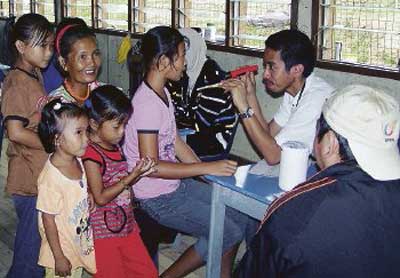Redefining rules of engagement
Professor Tan Sri Dato' Dzulkifli Abdul Razak
Comment
New Sunday Times - 17-07-2011
ENGAGEMENT between universities and communities acquired a different dimension last week with the launch of the first summit of the Asia-Pacific University-Community Engagement Network (APUCEN) by Deputy Higher Education Minister Datuk Saifuddin Abdullah.
APUCEN was conceptualised in 2009 during the inaugural University-Community Engagement Conference in collaboration with the Global Alliance for Community Engaged Research and UNESCO-Asia-Pacific Programme of Educational Innovation for Development organised by Universiti Sains Malaysia (USM).
Two hundred participants from 16 countries worldwide attended the conference.
Indeed, APUCEN -- one of three resolutions adopted during the 2009 conference -- is aimed at enhancing social responsibilities and addressing the changing roles of tertiary institutions.
It also explores methods, experiences and strategies for community development. It is this last point which makes APUCEN unique, relevant and timely.
It focuses on what Asia-Pacific can offer by leveraging regional knowledge which inclines to the needs of the situation at hand.
APUCEN is poised for a meaningful role as its foundation members comprise more than 40 higher learning institutions (18 of which are Malaysian public universities) representing 10 countries.
The network prides itself on a number of differences. Unlike many similar networks which originated from the developed West, APUCEN is a purpose-built regional partnership that seeks engagement based on shared regional norms and values.
In addition, the "engagement" approach differentiates it from the Corporate Social Responsibility-like model (the so-called University Social Responsibility).
It endeavours to bring about "mutual learning and discovery in the co-creation of knowledge with partners".
In short, it empowers communities to participate as equal partners to determine what is beneficial to them and co-own a project to ensure that it is sustainable and successful.
Financially, APUCEN seeks to be independent of the government funding mechanism. It has engaged industrial partners to raise additional funds in an attempt to be more "autonomous" in achieving its objectives.
This also means that the network has an extended partnership arrangement.
Some RM30,000 was already raised on the day of the launch.
APUCEN also seeks to work with other credible grass-roots partner organisations to expedite a more meaningful process of engagement.
The summit deemed the participation of MERCY Malaysia and the United Nations Development Programme as fine examples of collaboration with civil society organisations.

A MERCY Malaysia volunteer examines a patient in Sabah
APUCEN subscribes to a "quadruple" partnership arrangement between academe, community, industry and civil society.
This is indeed a unique arrangement of a like-minded network of engaged institutions and organisations.
To further demonstrate this cohesive organisation, APUCEN operates under a common banner of the network rather than the individual member institutions.
This creates a common space in a truly borderless fashion where sharing of expertise, facilities and resources is optimised in a sustainable way to promote regional community understanding and upliftment.
APUCEN effectively breaks down the artificial structural barriers of knowledge creation and sharing between the modern and traditional, as well as between each discipline, member university and member country.
It is a truly inclusive approach that augurs well for the establishment of a community of scholars and learners -- which was how universities conducted themselves before modern ones came into being.
Sadly, this sense of inclusive communal relationship is fast losing currency as higher learning institutions assume a more parochial "national" status, even under the guise of "internationalisation".
In a write-up about the summit, it was rightly pointed out: "Revisiting the roles of universities in relation to the ways and kinds of knowledge being produced is vital to building the kind of world we dream of. If universities are to achieve their mission to develop and apply knowledge with society in mind, then their core functions have to be built not only on an academic basis but also upon an intellectual civil basis that can offer solutions to societal problems".
We must congratulate APUCEN for its bold stance on blazing new trails in redefining the rules of engagement for a more promising world in years to come -- where the conscience of each member of the academia is more sensitised to reach out to the less fortunate.
APUCEN deserves all the support that it can garner to realise this lofty goal.
For those who are keen to support and/or partner with it, contact the Industry and Community Network deputy vice-chancellor at USMat dvc_icn@usm.my
* The writer is the Vice-Chancellor of Universiti Sains Malaysia. He can be contacted at vc@usm.my
